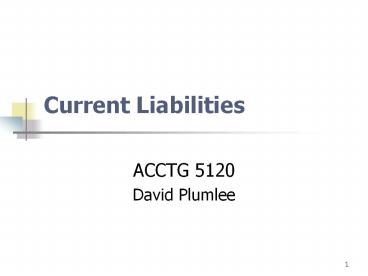Current Liabilities
1 / 12
Title:
Current Liabilities
Description:
Current Liabilities ACCTG 5120 David Plumlee – PowerPoint PPT presentation
Number of Views:3
Avg rating:3.0/5.0
Title: Current Liabilities
1
Current Liabilities
- ACCTG 5120
- David Plumlee
2
Current Assets
Why is the current classification important?
- It is important in inferring a companys ability
to pay.
Two commonly used ratios Current ratio
Current Assets Current
Liabilities Quick/acid test Quick Assets
Current Liabilities
3
Some Basic Definitions
- What is a liability?
- What makes a liability current?
- Obligation for future transfer of an entity's
cash, goods or services - Unavoidable
- Event has occurred
Uses current assets or other current liabilities
to liquidate
4
Operating Cycle
What is an operating cycle?
Acquire inventory
Collect Cash
Bill credit customers
Ship goods to customers
5
Common Current Liabilities
- Accounts payable
- Notes payable
- Current maturities of long term debt
- Interest bearing vs. non-interest bearing
- Gross or net
- Use of a discount contra account
6
Excluded from current
- When might liabilities normally considered
current not be classified as such?
When they are expected to be refinanced with
long-term liabilities
When they are actually refinanced from long-term
sources.
7
What does it take to evidence managers intent
refinance?
- Both
- The ability to do so evidenced by a written
agreement - Intent
What if they refinance after year-end (but before
statements are issued with long-term financing?
Still current at year-end!
8
Employee related--payroll
- What is the important difference between payroll
taxes and payroll withholding?
Payroll taxes are paid by the employer Payroll
withholding is paid by the employee and the
employer is merely a conduit
9
Contingencies
- What is a contingency?
- How do we disclose contingent gains?
- How do we disclose contingent losses?
An existing condition or circumstance involving
uncertainty as to possible gain or loss
They are NEVER recorded!
It depends on two criteria likelihood and
estimability
10
Disclosing Contingent Losses
Record the liability
Disclose relevant facts
Disclose relevant facts
Disclose relevant facts
Ignore
Ignore
11
Coupons and Warranties
- What methods are available to account for coupons
and warranties? - Which is GAAP? Why?
Accrual basis accrue in year of sale
Cash basis expense as incurred
The basic principle is matching. So, either can
work, but accrual is better.
12
Presentation
- Current liabilities
- Do not discount--put full value on the books
(except for notes payable) - Why?
- Disclose Other contingencies
- guarantees of others debt, obligations under
letters of credit, guarantees to repurchase
receivables, etc.
Short time period makes discounting infeasible.































